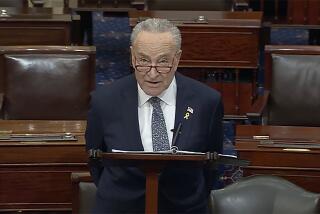Peres Says He Had the Votes but Passed Up Chance for Early Elections
JERUSALEM — Israeli Foreign Minister Shimon Peres, embroiled in a bitter battle with his coalition partners over a proposed international Middle East peace conference, said Friday that he had the votes in Parliament this week to call for early elections but did not move because procedural rules would have delayed a final vote until October anyway.
Peres said in an interview with The Times that “we could have had a majority for an early election last Wednesday,” at the Knesset’s last session before summer recess.
But forcing the vote on Wednesday “wouldn’t give us any advantages,” the foreign minister said. Knesset procedures require that such a bill pass three readings before it is enacted into law, and so the process could not have been completed until the fall, when the Knesset reconvenes. Such a delay, Peres indicated, would give his opponents too much time to undermine his position.
Peres hopes that early elections would give his Labor Alignment enough seats to form a narrow ruling coalition with smaller parties on the left, permitting him to pursue what he has called a possibly historic opportunity for regional peace.
Accord on Framework
Peres and Jordan’s King Hussein reportedly agreed on a U.S.-brokered framework for a international Middle East peace conference at a secret meeting in London last April. The Israeli is anxious to get the process under way by early 1988 at the latest for fear that otherwise the current momentum will be lost in the midst of the U.S. presidential campaign.
While there are other unresolved issues regarding the proposed, U.N.-sponsored conference, it is clear that nothing can happen without an Israeli government decision.
But Prime Minister Yitzhak Shamir’s opposition to the idea has been unwavering, and the broad “national unity” coalition that now joins Labor and Shamir’s rightist Likud Bloc is supposed to govern until November, 1988.
Until now, it has appeared that Shamir held sufficient support from the religious and other rightist parties to block Peres from winning a parliamentary majority for earlier elections.
Hints at Hidden Support
Peres hinted Friday that he had hidden support among Knesset members thought to be aligned with Shamir, but he refused to elaborate.
“Unless they will announce, I don’t feel like announcing,” he said.
But he also suggested that his hold on the majority may be tenuous. Asked if he will make his move for early elections as soon as the Knesset reconvenes in the fall, he replied: “It may be the case. . . . I’m not saying definitely because it’s a touch-and-go situation.”
Peres said he would gladly forgo early elections if it were possible to win support for the peace conference from the current “national unity” coalition. But given Shamir’s opposition, “that doesn’t look very promising,” the foreign minister conceded.
Peres was clearly perturbed by suggestions here and abroad that he has been outmaneuvered by Shamir on the peace conference issue. He tried to win Cabinet approval for the approach last May, but backed down when it became clear that he could not win a majority.
Then, Shamir quickly made promises to two smaller parties which appeared to hold the balance of power, averting an immediate threat of early elections.
“I’m a little bit annoyed by all the comments I’m reading in the media . . . as though I’m in a baseball game or something else,” Peres admitted. “It’s not a baseball game. It’s a very serious political move, without any serious alternative. And I consider all the others (alternatives) as light-headed approaches.”
Shamir argues that any international peace conference would be stacked against Israel. He proposes to entice Jordan into direct negotiations under a “regional” political umbrella provided by the United States and with Egypt, with whom Israel signed a peace treaty in 1979.
Peres said he is all for direct negotiations with Jordan as well but added that the only way to achieve that end is through an “international opening. . . . It was tried time and again to go straight to direct talks, and it didn’t bear any fruit.”
The foreign minister stressed that the progress already achieved is fragile.
“I know how easily one wind can blow away another wind in the Middle East,” he commented.
Asked if he was concerned that last week’s violence in Mecca involving Iranian demonstrators and Saudi police could be destabilizing, he responded: “I’m watchful about it. I know there is a potential that may destroy the peace process.”
He said he was particularly worried that a new Arab summit meeting could “strengthen extremist Arab positions” and destroy the foundation that has been built with moderate Jordan.
Peres refused to put a deadline on his drive for a peace conference, however.
“I’m not acting because there are windows of opportunity,” he said. “I’m acting because I’m convinced it is the only responsible alternative for Jewish destiny, for the state of Israel, for peace in the Middle East, for a Middle East which won’t become a fundamentalist Middle East.”
He said Israel is strong, but nonetheless faces “very serious problems.” The Arab minority under its control is growing rapidly, and promises to equal the Jewish population sometime during the first half of the next century. Its economy is stretched thin.
“Also, politically, you must understand that maybe there is a chance for peace that shouldn’t be missed,” he added. “Now, suppose I can’t mobilize a majority. What should I do? Give up? Or continue to fight? I shall continue.”
While there continue to be problems facing an international peace conference, Peres said, “I can also see the achievements. Never before was there such support for a move that includes an international conference in this country as there is today. I think also there is a change in world attitudes toward Israel, toward the peace process. Never was there such (a favorable) attitude in the Arab countries. So you can see some changes.”
Peres said he has no guarantee that new elections will change the current political stalemate, brought about by inconclusive results at the polls in 1984. However, he said: “I think we have a chance. The Israeli system of elections will never produce a landslide. Let’s face it: . . . we are really playing for several seats.”
Key to the results will be 400,000 young voters participating in their first elections, Peres said. That represents “almost 20% of the voting force in the country.”
Israeli Arabs, who will have 17% of the vote, according to Peres, will also have the power to “decide very much.”
Peres also said it is not yet clear what kind of role a newly active Soviet Union will play in the peace process.
“It’s not a settled situation with the Russians,” he said.
Soviets Offer Promises
He confirmed that Soviet officials have promised privately to renew a “political dialogue” with Israel sometime this month. However, he said, nothing has happened so far and “I don’t have any indications” what form the dialogue is supposed to take.
As a permanent member of the U.N. Security Council, the Soviet Union would theoretically play an important role in any international Middle East peace conference, although Peres stressed that Hussein has already agreed that outsiders could neither impose a solution nor veto any agreements achieved in direct talks between Israel and a Jordanian-Palestinian delegation.
Aides to the foreign minister have complained that in its determination to avoid interference in domestic Israeli politics, Washington has offered only lukewarm public support for the peace conference. But Peres refused to be drawn into criticism of the American role. “I’m not a person who complains or criticizes,” he said.
He said it was not up to him to tell the Reagan Administration what it should do.
“One should decide, is it an opportune time for peace or not? If yes, what should be done? And what should be done today is first of all to maintain (its) initiative, to see if the Russians are available or not--and available not on Russian terms, but on terms that are acceptable to the parties here and supported by the United States--and also to clarify the American position.”
Charles Hill, executive assistant to U.S. Secretary of State George P. Shultz, is due in Israel next week for talks with Israeli leaders about the peace process. Peres refused to reveal the focus of the talks, although there have been other reports here that Hill will make a last-ditch effort to persuade Shamir to drop his opposition to an international conference.
In an Israeli television interview last Wednesday, however, Shamir insisted that “on this subject there is nothing to talk about with me.”
More to Read
Sign up for Essential California
The most important California stories and recommendations in your inbox every morning.
You may occasionally receive promotional content from the Los Angeles Times.










